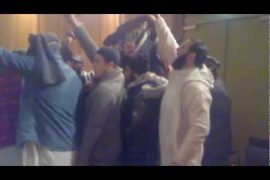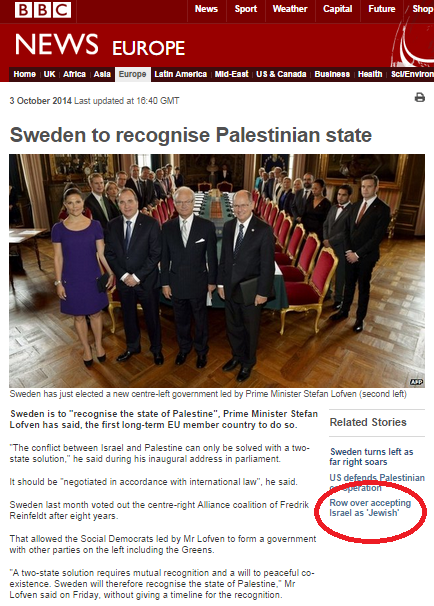In no fewer than three articles currently available on the BBC News website’s Middle East page, we find the promotion of the narrative according to which Israeli building in the area known as E1 would prevent territorial contiguity in a future Palestinian state.
An article from November 30th 2012 entitled “Israel to build 3,000 settler homes after UN vote” states that:
“Plans to build settlements in the area, known as E1, are strongly opposed by Palestinians, who say the development will cut the West Bank in two, preventing the creation of a contiguous Palestinian state.”
Another article from December 1st 2012, entitled “Hillary Clinton warns Israel on settler homes” repeats the same mantra:
“Plans to build settlements in the area, known as E1, are strongly opposed by Palestinians, who say the development will cut the West Bank in two, preventing the creation of a contiguous Palestinian state.”
A third article entitled “UN’s Ban Ki-moon warns Israel of ‘fatal blow’ to peace“, dated December 3rd 2012, states:
“Plans for construction in the E1 envelope are strongly opposed by Palestinians, who say such development will prevent the creation of a contiguous Palestinian state.”
All three articles also include the same not-so-handy map, which does little to explain the issue to BBC audiences.
The claim repeated in all three of the BBC articles above is far from a new one. Back in 2005 our colleagues at CAMERA produced a much more comprehensive map which puts the subject of “E1” into perspective.
For an explanation of the map and more reading on the subject, see here.
Update:
An additional article from December 3rd – “UK and France summon Israeli envoys in settlements row” – promotes the same erroneous narrative both in the body of the article itself and in a sidebar with analysis from the BBC’s Diplomatic Correspondent Jonathan Marcus.
Yet another article published on December 3rd – written by Jonathan Marcus and entitled “Israeli settlement move risks diplomatic fallout” – also repeats the same narrative. Notably, in both cases Marcus omits the caveat of “Palestinians say”, thus presenting the narrative as fact.
Whilst referring to the Israeli decision not to transfer customs revenues to the Palestinian Authority this month, Marcus makes no mention of the long standing arrears well in excess of 700 million shekels which the Israeli Electricity Corporation is owed by the PA and the Palestinian-owned ‘East Jerusalem Electricity Company’ (which supplies power to Ramallah, Bethlehem, Jericho and Beit Jala, among other places) and which those revenues will go towards paying.
The Israeli Electric Corporation also supplies electricity to Gaza, for which it does not receive any payment from the Hamas regime, as well as to parts of PA-controlled territory not supplied by the ‘East Jerusalem Electricity Company’ such as Jenin and Hebron. The cost of that electricity is taken from the revenues collected on behalf of the PA by Israel. The Palestinian Authority uses some 7% of the total electricity generated by the Israeli Electric Corporation. Meanwhile, Israeli consumers were informed this year that their electricity bills will rise by 31% over the next three years.







